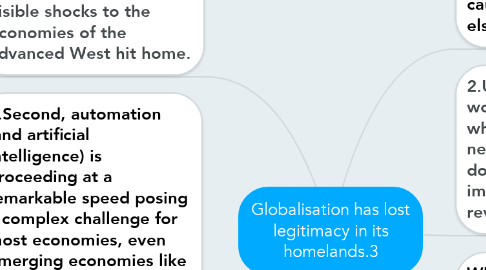Globalisation has lost legitimacy in its homelands.3
by Ashwathnarayan Rao

1. 3.There are three clear adverse trends to note. First, the advanced economies of the West, potentially beyond the US and UK, are set to increasingly look inward. On immigration, almost every advanced country will erect more barriers as political formations of the hard right gain ascendancy. The rise of the hard right will force the conventional right to take stronger anti-immigration positions. The appetite for opening up trade has already reduced—the World Trade Organization (WTO) is stagnant, the much hyped Trans Pacific Partnership is virtually dead—even if the real causes for job losses lie elsewhere.
2. 2.Unfortunately, for the world as a whole, the trends for the near term do not suggest any immediate reversion to openness.
3. What was the explanation (deliberately) given for the collapse of capitalism
4. 1. Free trade and immigration Were held to be the causes. These Were relatively soft, and easily identifiable targets. But the Real reasons were technological change and increased automation in both manufacturing and services were reducing jobs and depressing wages. These were all along often overlooked as more spectacular and visible shocks to the economies of the advanced West hit home.
5. Is there any immediate hope?
6. 4.Second, automation (and artificial intelligence) is proceeding at a remarkable speed posing a complex challenge for most economies, even emerging economies like China and India. A recent World Bank study concluded that automation threatens 69% of existing jobs in India and 77% of existing jobs in China. If the predictions begin to materialise, it will put countries on the defensive in terms of economic policy, never mind the fact that any jobs that are lost may be compensated by other jobs that are created. It is only realistic to note that any such transition would create losers in the short run—and politics is about the short term—and would require a different type of skill in the workforce.
7. 5. The third trend has little to do with economics, but it will impact the global economy adversely. And that is the spectre of Islamic terrorism which has now engulfed a wide geography from India’s Western frontiers to Europe’s Eastern and Southern frontiers (with parts of East Asia forming fertile ground). The trend of Islamic extremism is unlikely to ebb anytime soon, particularly if it has powerful backers in the form of countries like Saudi Arabia and Pakistan. And the longer it creates terror, the stronger will be the backlash against openness (particularly to immigration) in general.
7.1. New node


